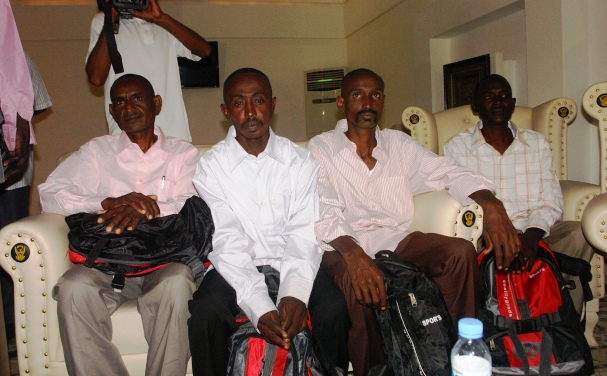Sudan says 11 detainees escaped JEM prisons in South Sudan
June 4, 2016 (KHARTOUM) – Sudanese government Saturday said that 11 Sudanese detainees managed to escape from Justice and Equality Movement (JEM) prisons in Deim Zubeir Camp in Western Bahr el Ghazal region, South Sudan after the camp was attacked and fully devastated by South Sudan armed opposition forces.

Senior officials from Sudan National Intelligence and Security Service (NISS) welcomed the detainees who arrived on Saturday in Khartoum Airport via South Darfur State’s capital, Nyala.
Speaking to media in Khartoum, NISS Director of Operations, Major General Dokhari el-Zaman Omer, said that the detainees were kidnapped by JEM before being transferred into South Sudan.
During the recent fighting between South Sudan’s army and opposition forces in Deim Zubeir, JEM camp in the area was burnt to the ground, said Dokhari el-Zaman.
Last month, security and military sources in South Sudan told “Sudan Tribune” that JEM fighters backed by government forces in Western Bahr el Ghazal region, had clashed with armed men allegedly allied to the opposition faction of the Sudan People’s Liberation Movement (SPLM-IO), capturing a military site previously held by the opposition forces in Deim Zubeir area.
However, JEM spokesperson denied involvement in the fighting in Deim Zubeir and affirmed that JEM has no presence in South Sudan.
It is noteworthy that the former rebel Justice and Equality Movement (JEM) faction led by Bakheit Abdallah Dabajo (?JEM-Dabajo) continued to call on South Sudan’s government and the international peacekeeping forces in the region to intervene to secure the release of its members being held captive by mainstream JEM inside South Sudanese territory.
The arrival of the former detainees and the celebration of the event took place 24 hours before the arrival of senior South Sudanese officials to discuss the implementation of the security arrangements agreed in September 2012.
Omer further added that the detainees managed to escape through the jungles and crossed into Sudan before being transported to Nyala and later to Khartoum.
He said that NISS was monitoring JEM’s activities in South Sudan and its fighting alongside the South Sudanese army against opposition forces, pointing to the movement’s involvement in recruiting and kidnapping Sudanese nationals.
“NISS was closely monitoring JEM military operations launched from South Sudan, especially the famous Gouz Dango battle, where the armed forces [Sudanese Armed Forces] crushed JEM fighters” said Omer.
In April 2015, the Sudanese government said its forces routed JEM fighters who carried out a major offensive on South Darfur state from South Sudan’s territory for the first time since several years.
Pictures and videos circulated in the social media and forums showing dead bodies, detained rebel fighters, and military vehicles captured from the rebels by the Rapid Support Forces (RSF) who ambushed the attacking force near the border with South Sudan.
Later, JEM admitted they have lost the Gouz Dango battle against the Sudanese troops but minimised its impact on their determination to defeat the regime of President Omer al-Bashir.
The NISS official further said that JEM continued to recruit fighters and build military bases in Deim Zubeir noting that several detainees are unaccounted for.
“South Sudan and JEM are blamed for the fate of the missing detainees,” concluded Omer.
“We have been detained in South Kordofan in 2013 and transferred to Deim Zubeir Camp in South Sudan,” said First Lieutenant, Mohamed el-Asha, one of the detainees who managed to escape.
He further said that JEM lost most of its forces in Gouz Dango battle and started recruiting children to use them in the fight in South Sudan.
Khartoum and Juba regularly trade accusations of support to rebel groups from both sides.
To settle this issue, the two countries committed themselves in the Cooperation Agreement of 27 September 2012 to stop supporting or harbouring rebel groups, and agreed to establish a buffer zone on the border and to form a joint monitoring team to prevent rebel infiltration.
However, the agreement was not implemented as Juba fears that the establishment of a Safe Demilitarized Border Zone (SDBZ) may irritate the Dinka Malual who believe that the deal leads to concede the disputed 14-Mile Area to Sudan.
(ST)
